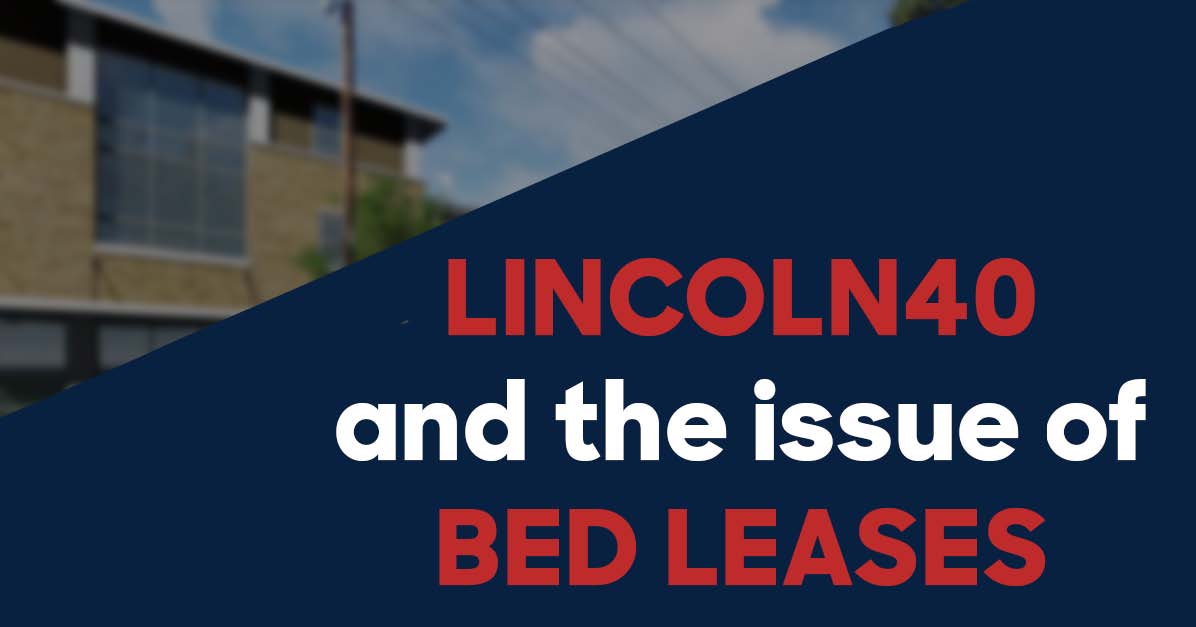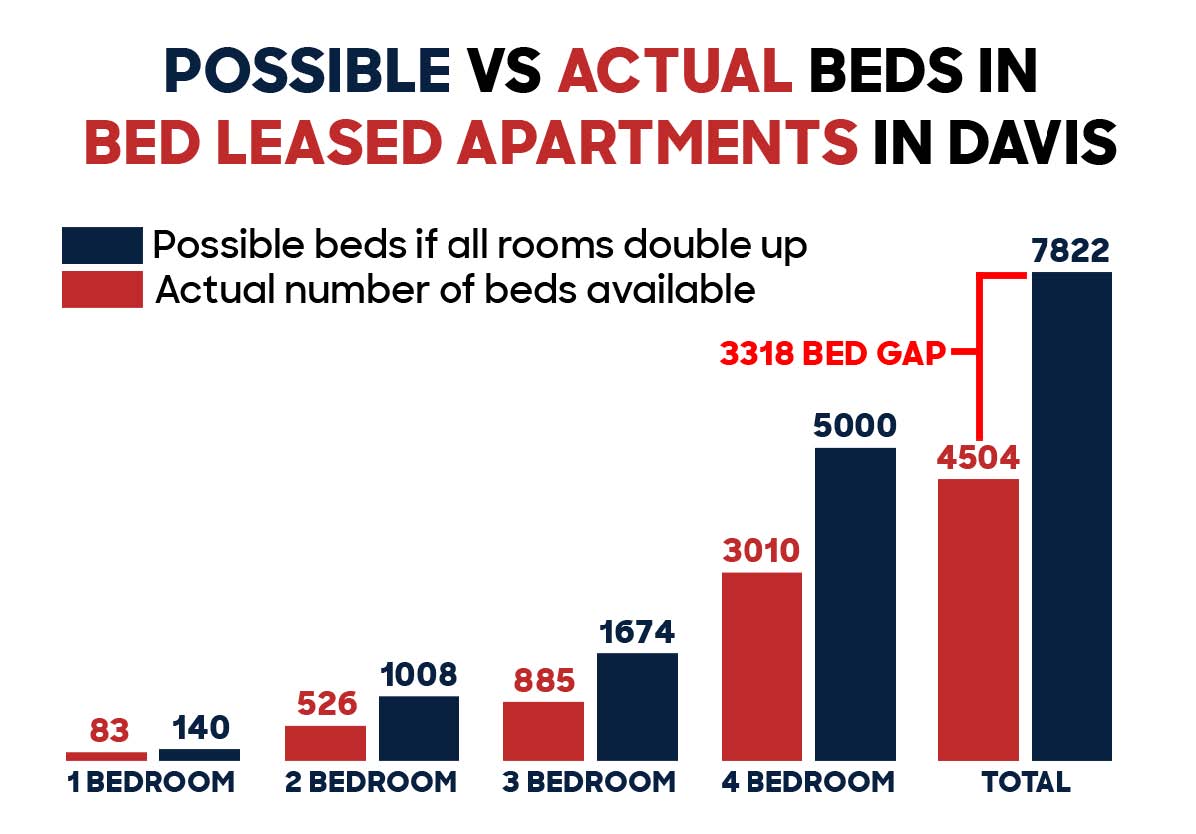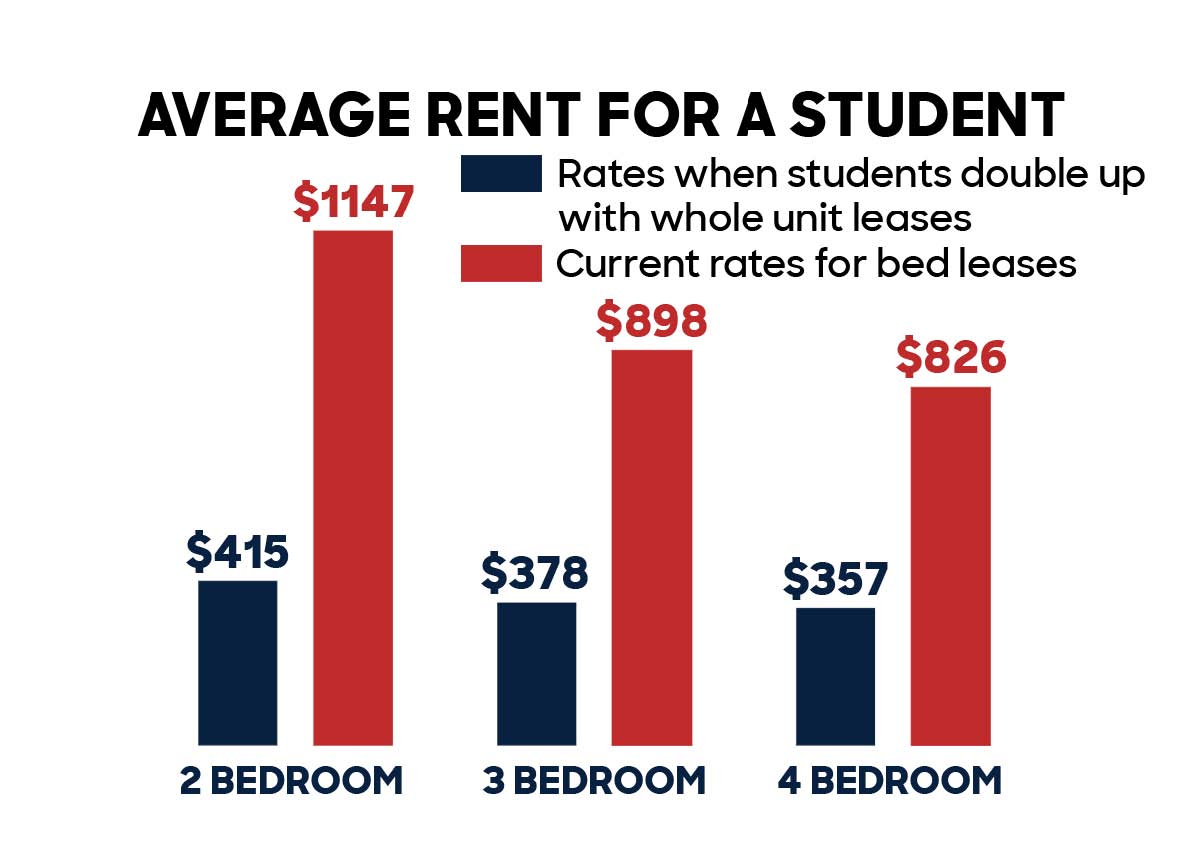
By M E Gladis
Yolo County Progressives would like to express our concerns about the lease by bed arrangement used at the Lincoln 40 development that you will soon be voting on. Leasing by the bed bars students from doing the one thing that makes housing affordable for them in Davis – sharing bedrooms and splitting the rent – and it is reducing the number of beds overall in our town.
Before addressing Lincoln 40, we must address the issue of ‘bed leases, ‘where landlords rent out a single bed to a tenant using an independent lease agreement instead of renting a whole apartment unit to multiple tenants using a single lease. According to the 2017 BAE UC Davis Apartment Vacancy and Rental Rate Survey Report, landlords in Davis are switching over bed leases at an increasing rate, with 13.12% of units now under this type of rental agreement – up from 10.49% in 2016. For the reasons outlined below, we believe that this trend is harmful to students and families alike in our town. First, bed leases artificially cap the number of beds, or tenants, in each unit. When students sign a single lease for an entire apartment unit, they are free to double or even triple up in their bedrooms, meaning they can live in high density. According to the 2017 BAE Report, units with bed leases, on the other hand, have a “relatively low incidence of double-occupancy.” Calculated together, if all the bed leased units allowed for double-occupancy in their bedrooms, there would currently be an additional 3,318 beds in Davis. Instead, with students and families struggling to find housing, we are going backward. Landlords who see they can make higher profits while housing fewer people are switching from leasing entire apartment units to leasing by the bed, thereby reducing the overall number of beds available in Davis.

Second, the actual motive for landlords to switch to bed leases is, of course, profit. According to the 2017 BAE Report, landlords charge an average of $1,147, $898, and $826 per bed in two, three, and four bedroom apartments respectively. It should be noted that this is already unaffordable for vast amounts of students and their families back home. Multiplied out, this nets landlords $2294, $2694, and $3304 for two, three, and four bedroom apartments respectively. These totals are higher than apartments that rent whole apartment units with a single lease: $1160, $2270, and $2858. And because students can double or triple up in each bedroom with whole unit leases, they pay three times less than their bed lease counterparts.

Finally, that brings us around to Lincoln40, which hopes to continue the use of bed leases. When the issue of housing in Davis has circled around low vacancy rates, high rents, with a limited amount of land to build on, we cannot understand why Davis’s City Council has so far endorsed Lincoln40. We, too, are concerned with the low vacancy rates in Davis and the hardships that students, including those in our group, are currently going through. But after having already approved Sterling Apartments, who will be leasing beds, we fear that also approving Lincoln40 will set a bad precedent, telling landlords that our City Council will do nothing to reverse the trend of bed leases. Already, current landlords are switching their units to bed leases so they can make more profits by housing fewer people. We do not believe that Davis can rely on market forces and build itself out of this mess on its own. Sacramento has a similarly low vacancy rate problem with families struggling to find a place to live, let alone an affordable one. On the other side, workers in the Bay Area look to Davis as a town with a more acceptable commute versus one further east. There members of our community who have been pushed out of Davis but long to return. And to top it all off, Wall Street has been buying up homes and inflating rents causing landlords all around them to do the same (The Intercept ).Clearly, then, if City Council wants to protect the students and residents of Davis, it must be able to act boldly. Yes, increase the number of beds in Davis, but do it through high-density housing that students will be able to afford by doubling up in their bedrooms. Enact rent control on the properties it is currently lawful to do so. Enact and enforce tenants ‘rights and protect members of our community from unsafe housing and unresponsive landlords. Giving in to the demands of HighBridge Properties and their high-profit designs for Lincoln40 is not going to save Davis. It’s time Davis’s City Council vote no on Lincoln40 untilthey are willing to come forward with a plan that won’t put profit beforepeople.If you agree and would like to send Davis City Council an email, pleasego to YoloCountyProgressives.org and fill out the petition. At the end of this article “Here” is what you click on.
Thank you.
M E Gladis is Chair of Yolo County Progressives (YCP)





Could it be that the reason that landlords want to now rent by the bed is so that they don’t end up with 4, 5 or 6 students in a room or 12 students all renting one house?
That is a factor.
This is indeed an understandable factor for landlords, and it is not what we are arguing for. Our math for whole unit leases was done assuming only double-occupancy in bedrooms and our argument is only against units with bed leases that, according to the 2017 BAE Report, are averaging single occupancy in bedrooms.
This is my statement officially: I saw ME last week and she mentioned this to me. The Vanguard’s publication policy is to print submitted pieces from the community when it meets our guidelines and this does. That said, I need a chance to actually dive into the data. When I spoke to ME last week, one of my interns happened to be there and she was skepitcal that a lot of students are paying $400 for a bed. Maybe under the table, but not as a rule and not as an average. But I need to examine this further.
This is the standard hogwash of the anti-growth, anti-business liberal-progressive… and in this case, it is actually caused by the hogwash of the anti-growth and anti-business liberal progressive.
The landlords are meeting the market need. The market need is beds because whole apartments are in too short supply due to the hogwash of the anti-growth and anti-business liberal progressives that have the ability to block any and all significant peripheral housing development with Measure J/R.
Ask any student: “would you prefer to have a bedroom or even an apartment to yourself rather than just rent a bed in a shared bedroom?” What do you think the common answer would be?
Other college towns, except those in congested urban areas, are not seeing students cram 3-4 beds into a bedroom. If we want to stop this trend, then build more bedrooms. Simple.
[moderator] Please stop using the sorts of characterizations that I have bolded above. You can make your point fine without those kinds of comments. Thanks.
It seems like the author is not aware that while in the past in the West Village the “by the bed leases” did not allow people to share a room and split the rent this is now allowed at West Village and everything I have read about Lincoln 40 said they will also allow room sharing.
It is also important to remember that the “main” reason the places leasing by the bed are more expensive is that they are the nicest newest property in town (not that they lease “by the bed”. I am not aware of any older dumpy property switching to leasing “by the bed”. The author says “landlords in Davis are switching over bed leases at an increasing rate”.
I know of some older property in town that sold and after a multi-million dollar renovation switched to by the bed leasing, and Tandem the largest student landlord in town is doing some by the bed leases but I have not heard of any other local landlord with an older property switching to “increase the rent”. Does anyone know the name of any apartment that has made the switch?
P.S. Can someone explain the math in the chart above and why the number of beds would not “double” if every room “doubled up”?
I need to look further, but I don’t know where she got a lot of the data from.
All our data was sourced from the 2017 BAE Housing Survey that David reported on last week. It doesn’t include information about specific apartment complexes, only general trends, so please keep that in mind. Even if West Village is now allowing for double occupancy (which is excellent), according to the survey: “the average number of beds per unit, by unit size … generally illustrates the relatively low incidence of double-occupancy bedrooms among bed-leased units.” So one bedroom units average 1.2 beds, two bedroom units average 2.1 beds, three bedroom units average 3.2 beds, and four bedroom units average 4.8 beds. And this is what we found most concerning. The report states there is “an average of one double-occupancy bedroom per four-bedroom unit.” We think all units should be averaging double-occupancy in all their bedrooms.
Obviously, there are some units that allow double occupancy. That is why the average beds per units are slightly higher than unit size (and also why the number of beds available does not exactly double if they all became double occupancy). But with such low vacancy rates in Davis overall, we’re not comfortable with the fact that four-bedroom units using bed leases are averaging less than five tenants. We should be making better use of our limited space.
Our comment that landlords are switching over to leasing by the bed includes apartments that get renovated and then switch from leasing the entire unit to leasing beds. Our issue is not with the fact that they increase rent for newer/renovated apartments; that is understandable. Our issue is that they are switching to bed leases that, on average, only have single occupancy per bedroom and therefore end up costing students more in rent.
Take, for example, a four-bedroom apartment. Currently, a whole unit lease for a four-bedroom apartment averages $2858/month. If you assume that each bedroom has double occupancy, that comes out to $357/tenant. Now take a four bedroom unit that leases by the bed. The average lease for a bed there is $826/bed – and you can’t split that cost with anyone. And instead of housing eight students, they’re barely housing five on average but at the end of the day, they’re netting $3304/month ($826*4) and so there is little reason for them to house more students.
Lincoln 40 states that half their bedrooms will be double occupancy but the other half are limited to single occupancy – no option for double occupancy. We obviously don’t know how many apartment complexes cap the number of beds at one via the lease agreement or how many discourage it through other methods. For example, Arlington Farm Apartments will charge $950 for a single bed or $525 per bed if you want to double up – netting them an additional $100 for the same room if two people decide to room together. This kind of tactic isn’t possible with whole unit leases where landlords charge the same rent regardless of whether all the rooms are single occupancy or all of them are double.
Of course, this is our understanding of the data presented by the BAE report. We’d like to hear all of your perspectives on this data. But I want to reiterate that we are not against growth. We’re not arguing against student housing – I’m a student that can’t afford to live in Davis. We are concerned that if we wish to increase our vacancy rates, we should be focusing on building high-density apartments. We want to ensure that housing is affordable for students and that it will make the best use of the limited land that we have. But some new developments, like Lincoln 40 and other complexes that get renovated and changed, are running counter to that.
Hi Harry: I found a number of problems with the analysis. If interested, please contact me (number and email are at the bottom of the website) and I’d like to discuss.
Piling students in an apartment is not legal — they state limits, students break them. Same with bed leases. No difference.
I’m wondering if Alan meant to write “Piling students in an apartment is not illegal” since if anyone calls the cops to complain that 20 students are living in a 2 br home house behind them (throwing red cups over the back fence) the cops will tell you they are not breaking any law (and you will get the same answer when you rent a home to two students and look for a “law” that stops 18 friends from sleeping at the home…
What is “a bed”? A twin? Queen? King?
Depending on a number of factors, can see two folk sharing a twin, and three sharing queen or king…
Definitely possible for a “two-some”, but “three-somes” are not unheard of… [“menage-a-trois”].
So, what is a “bed” for a ‘bed lease’?
A bed lease is a person who is on the lease individually, separate from other roommates.
The BAE report that this article and Harry references: “One of the more complex dynamics of the local rental housing market is the practice of renting out individual apartment units to multiple tenants using multiple lease agreements. Under this type of arrangement, known as a “bed lease,” each bed or bedroom in an apartment is associated with a separate lease agreement. This is compared to the more conventional approach, whereby each unit is rented under a single lease and all of the tenants living in the unit sign the lease and are jointly responsible for the complete monthly rent for the entire unit. For the purposes of this survey, this latter arrangement is called a “unit lease.””
Thanks for the clarification…